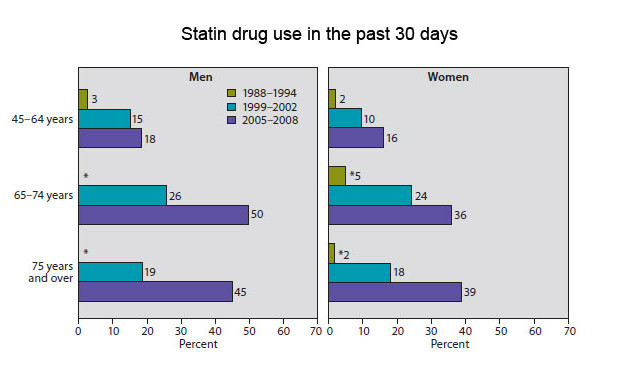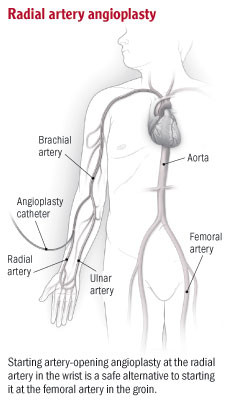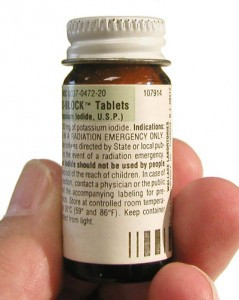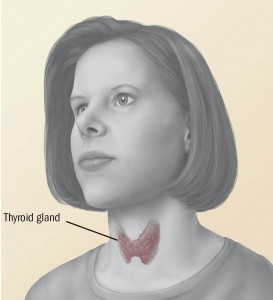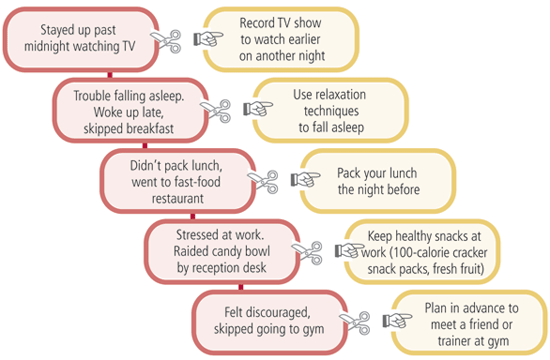
What are somatic workouts?

How to curb your stress eating

How to spot Parkinson’s disease symptoms

8 simple ways to reduce ultra-processed foods in your diet

Heart failure symptoms in women: How they’re different

GERD diet: Foods to avoid to reduce acid reflux

Strong is the new skinny

Everyday habits that sneakily weaken your bones

Don’t wait to get help for back pain

Correcting how you walk may ease osteoarthritis knee pain
Harvard Health Blog
Read posts from experts at Harvard Health Publishing covering a variety of health topics and perspectives on medical news.
Articles
Statin use is up, cholesterol levels are down: Are Americans’ hearts benefiting?
The latest annual snapshot of health in America, a report called Health, United States, 2010 offers hours of browsing and food for thought for anyone interested in health trends. Harvard Health Letter editor Peter Wehrwein connects the dots between use of cholesterol-lowering statins and fewer deaths from heart disease.
Two techniques for reducing stress
Feeling stressed? Call a timeout, counsels “Stress Management,” a new Special Health Report from Harvard Health Publishing. One way to stop stress and worry from taking over your days involves setting aside 15 minutes or so to focus on your problems. When the time is up, try to leave your worries aside and focus on something more productive. Writing down your worries and dropping them in a “worry box” can also help, explains Harvard Health editor Annmarie Dadoly.
Mindfulness meditation improves connections in the brain
Mindfulness meditation can ease stress. It also seems to do a lot more, like help with physical and psychological problems from high blood pressure and chronic pain to anxiety and binge eating. New research shows that mindfulness meditation changes the way nerves connect.
From the wrist to the heart: new angioplasty method is safe, effective
Angioplasty is a simple, safe alternative to open heart surgery for restoring blood flow through a narrowed or blocked coronary artery. Results of a large international trial show that a new approach to angioplasty that begins with the radial artery in the arm is as effective and safe as the traditional approach, which begins with the femoral artery in the groin.
Kids and social media: Guidance for parents
Confused about how to extend analog parenting into the digital world? New guidelines from the American Academy of Pediatrics offers practical advice to pediatricians (and parents) to help children use social media tools safely and in ways that encourage them grow socially and emotionally. Michael Miller, M.D., editor of the Harvard Mental Health Letter, says the guidelines are “anchored in what we know about child and adolescent development rather than any perceived special influences of the social network.”
What is a PSA test?
Doctors use this test to screen for prostate cancer, but it does not provide a definitive diagnosis.
FDA panel finds no link between artificial food colorings and hyperactivity in most children
Artificial food coloring has been blamed for causing hyperactivity in children. For most kids, there is no connection between food coloring and hyperactivity, an FDA panel has concluded. But it also noted that certain children with attention deficit hyperactivity disorder (ADHD) may be uniquely vulnerable, not just to food colorings, but to any number of food additives. The panel said that food additives themselves are not inherently toxic to the nervous system, but that some children have a unique intolerance to these substances.
Play Ball: Will new rules for bats make baseball safer?
When a hitter makes solid contact with a baseball, the ball leaves the bat travelling very fast. The type of bat matters — ball speeds are higher with aluminum and newer composite bats than they are with wood bats. Why? Wood bats are solid. When one smacks a ball, the bat stays fairly rigid and the ball flattens out for a millisecond, absorbing some of the energy in the bat-ball collision. Aluminum and composite bats are hollow. When they strike a baseball, the bat gives. That means more of the energy of the bat-ball collision is transferred to the “bounce” of the ball off the bat. Harvard Health Letter editor Peter Wehrwein talks with experts in sports injury, the physics of baseball, and bat testing to explain connections between bat type and injury.
Visual and audio guides to radiation risk
It can be hard to understand what the release of radiation from Japan’s earthquake-damaged Fukushima Daiichi nuclear power plant means in terms of human health. Are the radiation levels dangerous and, if so, how dangerous. Most reporters put the risk into perspective using words. Cartoonist Randall Munroe and nuclear reactor operator Ellen McManis have put together different ways of illustrating the risk visually, while radio producer Adam Ragusea offers an audio illustration of various radiation exposures.
At Harvard Forum, experts debate how much vitamin D is enough
A panel discussion at Harvard School of Public Health called “Boosting Vitamin D: Not Enough or Too Much?” highlights the current controversy over the once-overlooked sunshine vitamin. A panel of experts assembled by the Institute of Medicine recommends a daily dose of 600 IU per day for everyone from ages 1 to 70 and 800 IU for those over 70. Other experts think the IOM recommendation is too low. One way to get vitamin D is to spend a few minutes a day outside in the sun, but that’s a hot-button issue because sun exposure is a cause of skin cancer.
The mental and emotional challenges of surviving cancer
New government statistics show that there are nearly 12 million cancer survivors in the United States. In many ways this is terrific news, and a testament to improved diagnosis and treatment options. But there’s a flip side to surviving cancer, and many survivors are never totally “free” of the disease. The ongoing psychological and emotional issues can be almost as much a challenge as cancer treatment was. Harvard Health editor Ann MacDonald explores the ongoing fear of recurrence, survivor guilt, the “Damocles syndrome,” and more.
Understanding heart failure
Heart failure, the condition that took Elizabeth Taylor’s life, affects millions of Americans. The term “heart failure” is a scary one, conjuring up images of a heart that is suddenly unable to work. In truth, it represents a gradual decline in the heart’s ability to pump enough blood to meet the body’s needs. As the heart weakens, all parts of the body suffer the consequences. Harvard Heart Letter editor PJ Skerrett explains what heart failure is, how it affects the body, and what can be done to treat it.
Oh please, not the “sex causes heart attack” story again
Having sex (or performing any kind of physical activity) triples the risk of having a heart attack, according to a new study. But there’s more to the story. The odds of having a heart attack during sex are about 1 in one million; tripling the risk boosts it to 3 in one million. In other words, sex can cause a heart attack, but usually doesn’t. And the more a person exercises, or has sex, the lower the chances of having a heart attack during the activity.
Suicide is forever, but the stress leading up to it is often temporary
Many suicides are impulsive, with just minutes or an hour elapsing between the time a person decides upon suicide and when he or she commits the act. Yet the stressful events that lead to suicidal thoughts are often temporary, such as losing a job or having a romantic relationship end.
Radiation risk in Japan: an update
Several people who read my earlier post about radiation readings at the Fukushima Daiichi nuclear power plant in Japan pointed out that the time period over which the radiation exposure occurs is important. They’re right—the radiation dose and how long you are exposed to it determine how much radiation you are receiving. That is why […]
Radiation risk in Japan: understanding radiation measurements and putting them in perspective
News from Japan is full of talk about radiation risk and millisieverts. Harvard Health Letter editor Peter Wehrwein explains radiation doses and compares what’s happening in Japan with other exposures, from medical testing to Chernobyl and more.
Potassium iodide pills and prevention of thyroid cancer from Japanese nuclear power plant
Japanese officials are preparing to distribute potassium iodide pills to people living near the nuclear power plants crippled by last week’s earthquake. Harvard Health Letter editor Peter Wehrwein explains what these pills do and who needs them.
Thyroid cancer a hazard from radioactive iodine emitted by Japan’s failing nuclear power plants
The steam emitted by Japan’s failing nuclear reactors contains radioactive iodine-131. People living near the reactors can get substantial doses of iodine-131 by breathing the vapor from the reactors or ingesting iodine-131 from food or water. It accumulates in the thyroid gland, and significantly increases the risk of developing thyroid cancer.
Bridge the intention-behavior gap to lose weight and keep it off
The hardest part of trying to lose weight is the “intention-behavior gap.” That’s the disconnect between knowing what you need to do and actually doing it. A behavior chain can help you bridge the gap. This tool can help you recognize how a series of seemingly minor events can lead to an unfavorable outcome, such as overeating, and how to break the links.
Sugary soda and juice can boost blood pressure, weight
A large new study links drinking sugar-sweetened sodas and juices with higher blood pressure and extra pounds. The results are in line with earlier studies, and with some clinical trials, showing that daily consumption of sugar-sweetened beverages isn’t so good for the body.
Teens who smoke pot at risk for later schizophrenia, psychosis
Teenagers and young adults who use marijuana may be messing with their heads in ways they don’t intend. Ongoing research shows a possible link between early use of marijuana and later development of psychosis or schizophrenia.
Living with chronic headache: A personal migraine story

What are somatic workouts?

How to curb your stress eating

How to spot Parkinson’s disease symptoms

8 simple ways to reduce ultra-processed foods in your diet

Heart failure symptoms in women: How they’re different

GERD diet: Foods to avoid to reduce acid reflux

Strong is the new skinny

Everyday habits that sneakily weaken your bones

Don’t wait to get help for back pain

Correcting how you walk may ease osteoarthritis knee pain
Free Healthbeat Signup
Get the latest in health news delivered to your inbox!
Sign Up
